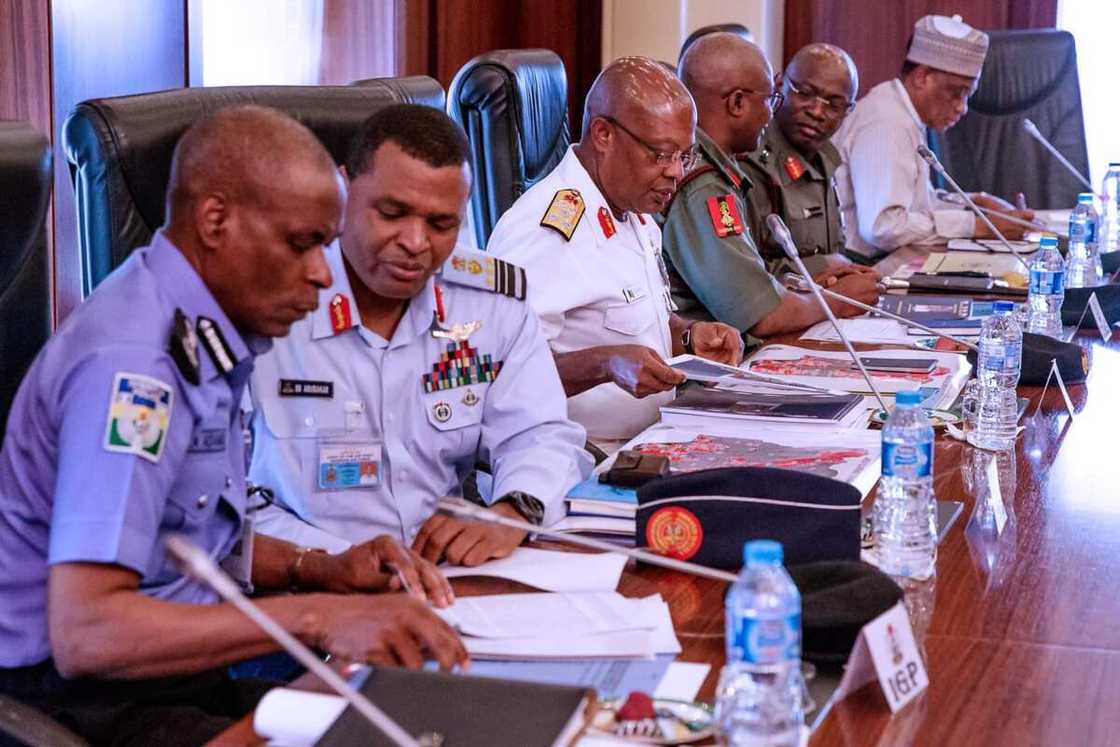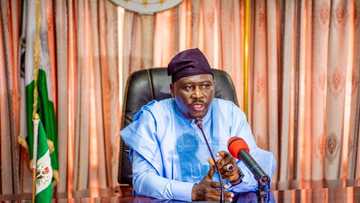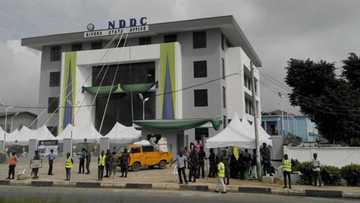Opinion: Understanding why our security chiefs deserve national honours by Nkechi Odoma
Editor's note: Nkechi Odoma, a public affairs analyst highlights the major roles played by the Nigerian Military leadership in ensuring the insurgency in the northeastern part of Nigeria ends.
Odoma also highlights why Nigerians must understand that the call for the sack of the service chiefs is politically motivated.
Disclaimer: The views and opinions expressed here are those of the author and do not necessarily reflect the official policy or position of Legit.ng.
Your own opinion articles are welcome at info@corp.legit.ng— drop an email telling us what you want to write about and why. More details in Legit.ng’s step-by-step guide for guest contributors.
Contact us if you have any feedback, suggestions, complaints or compliments. We are also available on Twitter.
“Look at what we have on the ground before May 2015, the Boko Haram were even in Abuja, they were in Kano, they were in Kaduna.
They were penetrating down to the south, we had to stop them. And for the past one and half years, we’ve not had any attack in Jos, neither in Abuja, in Kano, or in many other places, even as close as in Gombe.--- General TY Buatai, Nigeria’s Army chief and leader, counter-insurgency operations in an interview recorded and aired by BBC’s Hard Talk show, in January 2017 and rebroadcast by The News in January 2020.
In very conspicuous bias, premeditated motives and partisan undertones during plenary sessions on Wednesday, January 29, 2020, National Assembly (NASS) slammed the gavel in approval of negative resolutions on the president and our security chiefs.
This was after intensive debates which reviewed the state of insecurities in the country as manifest in the spate of renewed attacks and killings in parts of the country.
Some members noted the 2020 resumed pockets of onslaughts by Boko Haram/ Islamic State in West African Province (ISWAP) terrorists and suspected Fulani herdsmen, which resulted in killings of innocent Nigerians. Therefore, in their selfish thinking, they have passed a vote of no-confidence on the entire security architecture in Nigeria and senselessly endorsed their ouster.
Their sword and venom spared none. All were unfairly pulled down by NASS, from the topmost echelons in Nigeria’s security apparatus like the National Security Adviser (NSA), Military Chiefs, Director-General (DG), Department of State Security Service, the Inspector-General of Police (IGP) and other security outfits in the country in the age of Nigeria’s multifarious battles with insurgencies and insurrections.
To my mind, their deliberations on the security situation was not a bad idea. But the tenor of the debates in both chambers mesmerized me. It was not tailored towards solutions, but undisguised vindictiveness.
Only a few legislators attempted to discern the problems underneath the renewed acts of terror of different dimensions in Nigeria. None of the heads of Nigeria’s security deserved a word of commendation and encouragement from NASS for the priceless sacrifices they have continued to make for the peace, security and progress of Nigeria. NASS simply wished everybody goodbye for “failing” the nation.
What else could anyone expect from a congregation of national lawmakers, who are least concerned with public good outside their personal benefits? It stinks that NASS is more interested in siding the enemies of Nigeria against Nigeria.
But what do you expect, when internal emotions, personalized pursuits of objectives, hatred, ethnic and religious agendas infiltrate the chambers of a national parliament? Clearly, majority lawmakers are on a voyage of total ruination and destruction of Nigeria in order to voraciously scramble for the mutilated parts of the nation.
It beggared belief that the majority of lawmakers sided with an odd position while deliberating on the state of the nation on security. The wise men among them, who understood the dynamics and attendant impediments needed to be resolved before the full assurance of securing Nigeria from armed mercenaries were in the minority.
Such issues like the gross underfunding of the security architecture, inadequate and outdated weapons, poor remuneration of troops, and an insufficient number of personnel, among a motley of other debilitating problems were raised by faint voices. These spurred and berthed poor performance by security agencies in 2019/ 2020, but voices that were not strong enough to prick their conscience.
But the national parliamentarians’ obsession with the security chiefs overstays in office was lethal. I believe the NASS has a lot to learn from its pitfalls. It is never too late to bend even backwards to rectify an error. Obviously, the NASS resolutions on Mr President and the Chiefs are impermissible errors.
Our NASS cannot pass the guilt of their pleasurable negligence or dereliction of duty on fulfilling its constitutional obligations to other leaders on the simplistic assumption that they clad and bask in the euphoria of legislative immunity on the floor of the chambers. The recklessness they exhibited can be corrected, only if they know the hard reality outside the confines of the chambers of NASS.
Touting President Buhari and the chiefs as failures on securing the country in 2019 and the spillover to 2020, while exonerating legislators’ complicity resonates with maddening fury among sensible and clairvoyant Nigerians.
I keep referring to the wisdom of the prolific writer and famed international scholar, Prof. Chinua Achebe, whose timeless warning that “Unless you know where the rains began to beat you; you won’t know the extent you are soaked.”
By last Wednesday’s action from our national parliamentarians, it animated my judgmental instincts, pinned to a scary and dreary reality. It is simply that NASS members have neither any inkling into the intensity of Boko Haram before May 2015. Nor how it was tamed and reasons for its resurgence or the path to solving the problem, while extending patriotic honours to those in charge and leading the troops.
Like Achebe echoed, the Nigerian national legislature is devoid of this wisdom. So, some of them stood up in plenaries and disgorged rubbish like drunken sailors, spat everyone else except themselves.
I recall that by May 2015, when President Buhari came on board and appointed the current crop of Security Chiefs, Nigeria was under the worse siege by Boko Haram insurgents. It operated from a single plank, yet brutal in its violent campaigns or horrendous atrocities.
Nigeria lost control of at least 17 LGAs in the northeast to Boko Haram and terrorists had captured, declared and foisted jihadi flags in Gwoza and Baga as the administrative headquarters of the Islamic militants and pushing further to annex more territories. And outside the Chibok schoolgirls over 20, 000 Nigerians were held hostage in Boko Haram’s secret camps including women and children.
Boko Haram had captured the entire Northern part of the country and was on a steady supersonic speed to make ingress into Southern Nigeria. Terrorists freely tortured hostages and subjected them to various forms of dehumanization, forced labour, servitude, sexual abuses and extra-judicial executions.
The then lone Boko Haram leader, Abubakar Shekau frequently insulted and derided our collective strength of nationhood by releasing videos of these horrible executions and threatening more. IDPs camps swelled in the northeast and spilt into neighbouring African countries by thousands of distraught Nigerian refugees fleeing from ravaging insurgency.
But the current impugned leaders of the counter-insurgency operation reversed the negative narratives as directed by the President. By December 2015, Boko Haram insurgency had been significantly decimated and technically defeated; Nigeria’s conquered territories retrieved from vicious terrorists and thousands of Boko Haram hostages regained freedom. These are facts documented in national archives.
There are several incidents of Boko Haram incidents that support my claims. But let me cite Nigerians’ one noticeable encounter with Boko Haram strikes reported on October 31, 2014. In symbolic conquest of Nigeria and field triumphs of terrorists against the country, Vimtin, in Mubi LAG, Adamawa state, and the home town of the then serving Nigeria’s Chief of Defence Staff, (CDS), Air Chief Marshall Alex Badeh (may his gentle soul rest in peace) was completely overrun by Boko Haram militants.
The terrorists' onslaught on Mubi forced Nigerian troops to flee the area together with thousands of civilians was lethal. I know, similar gory scenarios were replete everywhere in the Northeast before May 2015.
That’s the level Boko Haram, though yet to be actively backed by the Iranian ISWAP wreaked havoc on a defenceless nation and her peoples. However, I learnt, that by the beginning of January 2015, Boko Haram had struck underground ties with terrorists of the Islamic State sect (ISILS).
But the Security Chiefs have discharged this mandate evidentially as I earlier listed, by a determined and courageous push-back of insurgents and reclaimed seized parts of Nigeria. This is even in the face of multi-dimensional militant terrorists’ sects which have converged on Nigeria including ISWAP.
Yet, the service chiefs have contained them, capturing most of their top commanders, foot soldiers who either voluntarily surrendered or were captured in battles; blocked the recruitment and rearming of new entrants; terminated the reign of reckless female or child suicide bombers and so forth.
Boko Haram/ISWAP terrorists has reenergized, ostensibly with increased funding from ISWAP. It heightened at the peak of 2019 partisan campaigns. Terrorists began raids with a greater number of fighters on their convoys; modern and sophisticated weapons. Nigeria failed to march up with the changing tide.
I do know, in the course of counter-insurgency combats, the armouries of Nigerian troops are also depleted and requires constant replenishment. Nonetheless and perniciously, some Nigerians are brainwashed never to admit this fact and believe once weapons are secured for counter-insurgency, it should serve troops for a life-time.
This mindset has been emulated by a hostile NASS leadership, which rejected a request from President Buhari to grant about a mere $1billion loan to purchase Tucano fighter jets/weapons from America and other countries.
NASS is less concerned about improving allocations on defence budget, which is within their lawful powers. Each time they pad national budgets, the extra-budgeting only takes care of their personal welfare or other projects they have vested interests to grab from the nation.
I came across a phone interview, published in The Vanguard Newspaper edition of June 29, 2019, A soldier in the frontlines, who pleaded anonymity draw national consciousness to their plight in the battlefields. I decoded his message and discovered, the resurgence of Boko Haram/ISWAP terrorism is not watered by the fault of the president, the chiefs or the Nigerian troops in the frontlines, but mainly the coldness of NASS members in doing the right thing.
But year after year, NASS has refused to address these concerns in appropriating the budget. Even with the resurgence of attacks and killings, NASS still obstinately clung unto its reserved and selfish disposition on allocating meaningful votes for defence. It encompasses, all the Armed Forces and para-military agencies participating in operations of counter-insurgencies and insurrections in Nigeria.
Confessions of the anonymous soldiers reminded me of another thorny issue, which has impeded recent operations against insurgency in Nigeria.
I challenge the NASS members to tell Nigerians how they responded to the plea by the Army for the operation of its airwing in the theatre of war when the 2020 Appropriation Act was still on their table?
The Theatre Commander of the Army’s Operation Lafiya Dole, Major General Olusegun Adeniyi, pleaded with a recent delegation of NASS’s Joint Committee on the Army, led by Sen. Ali Ndume, that Boko Haram had never been as formidable as perceived, as only combat helicopters are needed by soldiers to munch ISWAP and Boko Haram terrorists to end the war, aside operating with outdated equipment.
The plea was made when the 2020 national budget was still at its infantile preparatory stage by NASS. Ab initio when President Buhari submitted the proposed 2020 Appropriation Bill to NASS totalling N10. 33 trillion and a breakdown indicated a paltry N878,458,607,427 total allocation proposed for the Ministry of Defence, experts on security complained loudly about the inadequacy of the amount to quench terrorism and emerging allied criminalities in the country.

Source: Facebook
But it all fell on deaf ears. Approved Nigeria’s 2020 budget is N10.59 trillion (USD 35 billion). But defence entirely got just about one per cent of it. The docility of Nigeria’s NASS over proper funding or attention to the insurgency is heart-breaking.
Interestingly, in spite of these operational constraints, the Nigerian military and sister security agencies have continued to play their constitutional roles. They conscientiously battle insurgency attacks even in the face of life-threatening or grave dangers and recorded several victories. And they are more determined despite the setbacks.
Some Nigerians forget easily Nigerians. Former president Goodluck Jonathan did not see this level of multi-dimensional conspiracies against his move to fight Boko Haram before giving up. But what has made the situation then and now differently unique is the fact that a war tested Army General is in charge and this has reflected in the successful operations of the Security Chiefs.c
Without mentioning names, everyone should be proud of the numerous achievements of the various Chiefs and how much they have helped to sanitize the armed forces. These are the Military officers some Nigerians want Mr. President to drop in a jiffy under flimsy excuses and personalized interests.
Based on this odious proclivity, whereas the world is looking for stars of counter-terrorism to fete with honour; in Nigeria, we are busy plotting ways to vilify and humiliate our security chiefs.
The NASS, therefore, has a religious obligation to reclaim its lost glory by doing the needful, including honouring the security chiefs.
PAY ATTENTION: Download our mobile app to enjoy the latest news update
All the security chiefs deserve national honours as the least they can get as appreciation from the national government for their services to our country.
Even if, institutions like NASS are deliberately blinded to this fact for whatever reasons, the world and those who understand global conflicts, prevention and resolution are celebrating Nigeria’s security chiefs.
NAIJ.com (naija.ng) -> Legit.ng: Same great journalism, upgraded for better service!
Buhari should put an end to banditry, unrest in Zamfara - Nigerians cry | Legit TV
Source: Legit.ng




